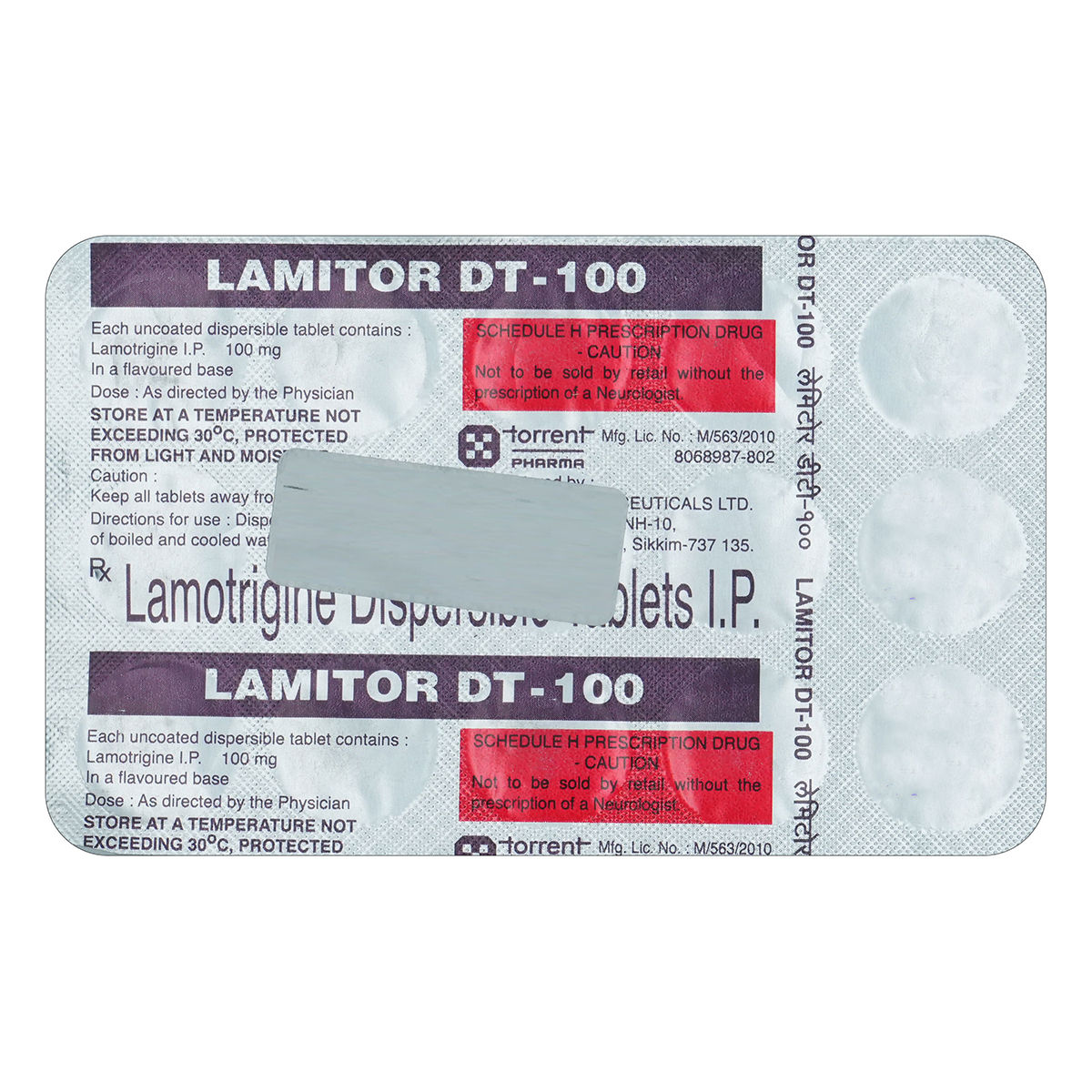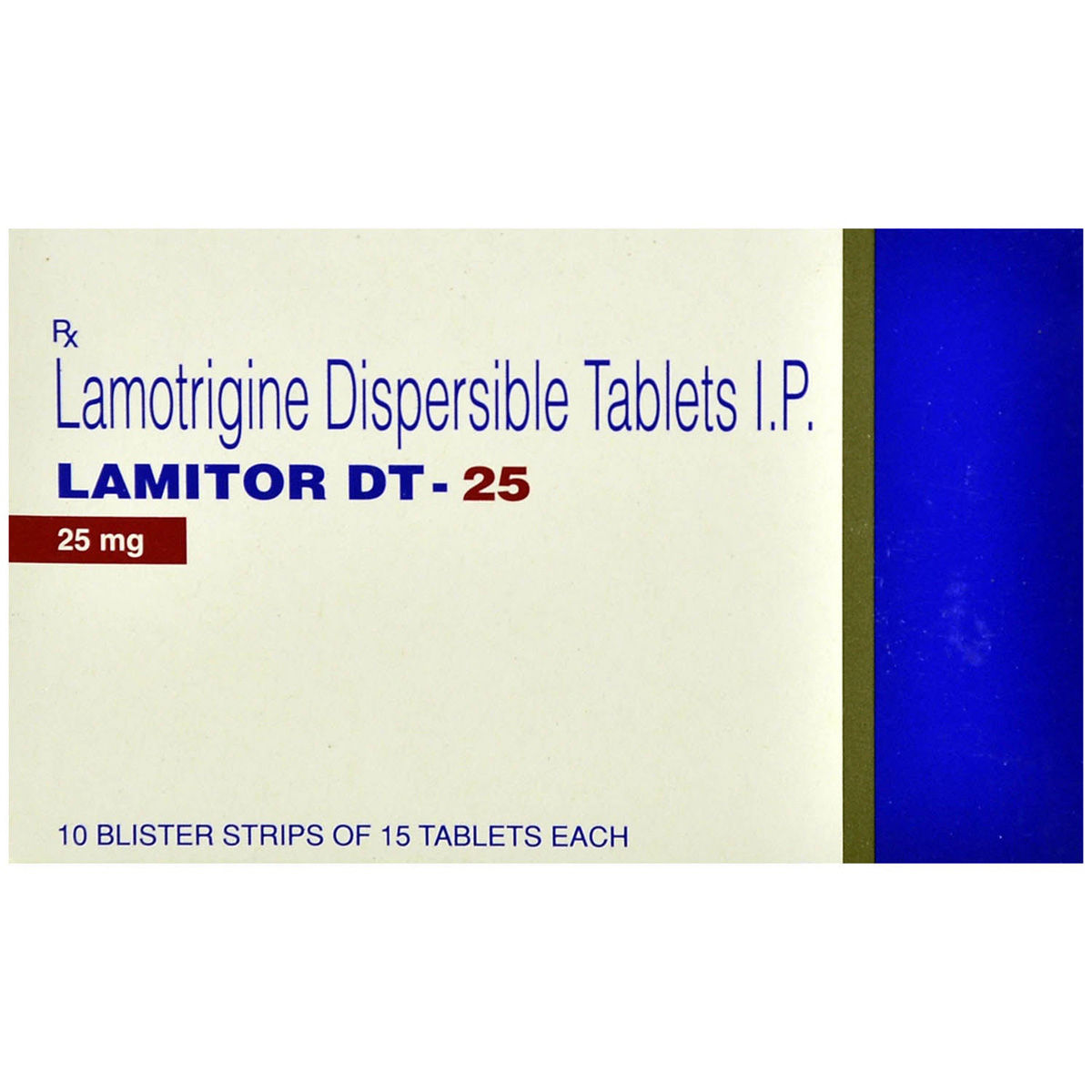Lamotrigine
About Lamotrigine
Lamotrigine belongs to a group of anticonvulsants or anti-epileptics used to treat epilepsy/seizures/fits. Additionally, Lamotrigine also treats bipolar disorder. Epilepsy is a sudden rush of electricity in the brain. In epilepsy, the brain's electrical rhythms become imbalanced, resulting in recurrent seizures, sometimes leading to an unconscious state. Bipolar disorder is a severe brain disorder in which a person experiences extreme mood swings (variance in thinking) and frequent mood and behavioural changes.
Lamotrigine contains 'Lamotrigine' that reduces the electrical impulses and subsequent firing of the nerve impulses that cause fits. Thus, Lamotrigine decreases the excessive and abnormal nerve activity in the brain, thereby controlling seizures.
You are advised to take Lamotrigine for as long as your doctor has prescribed it for you, depending on your medical condition. In some cases, you may experience certain common side-effects such as skin rash, headache, nausea, vomiting, dryness in the mouth, insomnia (difficulty in sleeping), sleepiness, dizziness, back pain, fatigue, abdominal pain, blurred vision, double vision, impaired coordination, nasal congestion (stuffy nose), infection. Most of these side effects do not require medical attention and will resolve gradually over time. However, you are advised to talk to your doctor if you experience these side effects persistently.
To treat your condition effectually, continue taking Lamotrigine for as long as your doctor has prescribed. Please do not stop taking Lamotrigine without consulting your doctor to avoid worsening of seizures. Do not take Lamotrigine if you are pregnant or planning for pregnancy unless prescribed by the doctor, as it could lead to serious congenital disabilities. If you are of childbearing age, use effective contraception while taking Lamotrigine. Consult your doctor before taking Lamotrigine if you are breastfeeding. Contact your doctor if your child gets her first period whilst on treatment with Lamotrigine. Do not drive or operate machinery as Lamotrigine causes drowsiness and dizziness. Avoid consuming alcohol along with Lamotrigine as it could lead to increased dizziness and sleepiness. Consult your doctor immediately if you experience suicidal tendencies.
Uses of Lamotrigine
Medicinal Benefits
Lamotrigine belongs to a group of anticonvulsants or anti-epileptics used to treat epilepsy and bipolar disorders. Lamotrigine contains Lamotrigine, which reduces the electrical impulses and subsequent firing of the nerve impulses that cause fits. Lamotrigine decreases the excessive and abnormal nerve activity in the brain, thereby helping in controlling seizures. It also suppresses the release of excitatory amino acid glutamate (a chemical messenger that acts as a nerve-exciting agent) in the brain, thereby preventing episodes of fits by stabilizing nerve cell's electrical activity in the brain. Lamotrigine is widely used in pediatric epilepsy because of its acceptable safety profile. Lamotrigine is not associated with any psychological or physical dependence, and there is no potential for abuse.
Directions for Use
Storage
Side Effects of Lamotrigine
- Skin rash
- Headache
- Nausea, vomiting
- Aggression or irritability
- Dryness in mouth
- Insomnia (difficulty in sleeping)
- Sleepiness
- Shaking or tremors
- Dizziness
- Back pain
- Fatigue
- Abdominal pain
- Blurred vision
- Double vision
- Impaired coordination
- Nasal congestion (stuffy nose)
- Infection
- Pain in your back or joints or elsewhere
Drug Warnings
If you are known to be allergic to Lamotrigine or any other medicines, please tell your doctor. Please consult your doctor before taking Lamotrigine if you are pregnant, planning for pregnancy, or breastfeeding. Using this medicine during pregnancy may cause harm to the unborn baby and also affect cognitive ability (reasoning, intelligence, problem-solving) later in your child's life. Lamotrigine should be used with caution in children. If you have depression, liver, kidney, or pancreas problems, urea cycle disorders, inflammation of the tissue that covers the brain and spinal cord, porphyria (a disorder in the formation of red blood pigment) or thrombocytopenia (low levels of platelets), inform your doctor before taking Lamotrigine. Consult your doctor immediately if you experience suicidal tendencies or mood swings. Do not stop using Lamotrigine without your doctor's advice. Stopping suddenly may cause a serious, life-threatening type of seizure. Lamotrigine may cause a severe or life-threatening skin rash, especially in children and in people who take a very high starting dose or those who also take valproic acid. If you have a skin rash, hives, blistering, peeling, or sores in your mouth or around your eyes, please inform your doctor immediately. Lamotrigine causes drowsiness and dizziness, so drive only if you are alert. Avoid consuming alcohol along with Lamotrigine as it could lead to increased dizziness and sleepiness.
Drug Interactions
Drug-Drug Interactions: Lamotrigine may have interaction with pain killers (aspirin), anti-epileptics (oxcarbazepine, felbamate, gabapentin, levetiracetam, pregabalin, topiramate, zonisamide, valproate, carbamazepine, phenytoin, primidone, phenobarbitone), blood thinner (warfarin), anti-HIV (zidovudine, lopinavir, ritonavir), anti-depressant (moclobemide, selegiline, linezolid, amitriptyline, sertraline, uetiapine, diazepam, olanzapine), anti-psychotic (quetiapine, olanzapine, risperidone), antibiotics (panipenem, imipenem, meropenem, rifampicin, erythromycin ), antimalarial (mefloquine, chloroquine) medicine used to treat cancer(temozolomide), calcium channel blocker (nimodipine), anaesthetic (propofol), hormone (oestrogen, levonorgestrel), antacid (cimetidine), bile-acid sequestrant (cholestyramine).
Drug-Food Interactions: Avoid alcohol consumption while taking Lamotrigine as it might cause increased dizziness and sleepiness.
Drug-Disease Interactions: Lamotrigine may have interactions with disease conditions such as depression, liver disease, Haemophagocytic lymphohistiocytosis (HLH) (immune disorder), Brugada syndrome (heart problem), suicidal tendency, HIV disease, thrombocytopenia (low levels of platelets).
Drug-Drug Interactions Checker List:
Safety Advice

Alcohol
unsafeIt is advised to avoid alcohol consumption while taking Lamotrigine. Alcohol intake, along with Lamotrigine, may cause increased dizziness and drowsiness. Please consult your doctor for more information.

Pregnancy
cautionLamotrigine is a pregnancy category C drug. Animal studies showed that Lamotrigine affects the fetus in pregnancy, but there is limited data in humans. Using antipsychotic drugs during the third trimester of pregnancy can cause muscle problems in new-borns. Please consult your doctor before taking Lamotrigine if you are pregnant or planning to conceive.

Breast Feeding
cautionIt is not known if Lamotrigine is excreted into the breast milk. Please consult your doctor before taking Lamotrigine if you are a breastfeeding mother.

Driving
unsafeLamotrigine may make you feel dizzy or drowsy. Do not drive if you are not mentally alert or experience any symptoms that affect your ability to drive or operate machinery.

Liver
cautionDose adjustment may be needed in patients with liver impairment. Please consult your doctor if you have a liver impairment or any concerns regarding this.

Kidney
cautionDose adjustment may be needed in patients with kidney impairment. Please consult your doctor if you have kidney impairment or any concerns regarding this.

Children
cautionLamotrigine can be given to children if prescribed by the doctor. The doctor will adjust the dose.
Habit Forming
Diet & Lifestyle Advise
- A ketogenic diet (low in carbohydrates and high in fats) is recommended for children with epilepsy. This diet helps the body utilize fat instead of glucose for energy generation.
- The Atkins diet (high fat and controlled carbohydrates) is recommended for adolescents and adults.
- Rest well, and get plenty of sleep.
- Avoid smoking and alcohol consumption.
- Exercise, meditation, and yoga can help lower stress, decrease pain sensitivity, and improve coping skills.
- Prepare your living area; small changes may reduce the risk of physical injury during a seizure.
- Install an alarm or emergency device to get assistance during a seizure attack.
Special Advise
- Contact your doctor if your child gets her first period whilst on treatment with Lamotrigine.
- If you are of childbearing age, use effective contraception without interruptions during your entire treatment with Lamotrigine.
- Consult your doctor immediately if you become pregnant while taking Lamotrigine.
- After taking Lamotrigine, if you have thoughts of harming or killing yourself (suicidal behaviour), stop taking Lamotrigine and immediately contact your doctor.
Patients Concern
Disease/Condition Glossary
Epilepsy: It is a brain-related problem in which there is a sudden rush of electricity in the brain. This sudden, uncontrolled disturbance in nerve cell's electrical activity in the brain results in recurrent seizures (fits), sometimes leading to the unconscious state. In patients with seizures, the typical brain electrical pattern is disrupted by sudden bursts of electrical impulses that affect an individual's consciousness, movements, or sensations. Seizures are of two types: generalized and partial seizures. Generalized seizures affect the entire brain, whereas partial seizures affect only a part of the brain. Seizures can cause uncontrollable muscle twitches and spasms. Stronger seizures may cause people to become confused or unconscious. Possible causes include high fever, trauma, genetic disorder, brain injury, or stroke.
Bipolar disorder: Bipolar disorder, also known as manic depression or bipolar disease, is a mental health disorder associated with episodes of mood swings ranging from manic highs to depressive lows.
FAQs
Lamotrigine is used in the treatment of Epilepsy (fits) and Bipolar disorder. It contains Lamotrigine, which reduces the electrical impulses and subsequent firing of the nerve impulses that cause fits. Lamotrigine decreases the brain's excessive and abnormal nerve activity, thereby helping control seizures.
Do not discontinue Lamotrigine without consulting your doctor. To treat your condition effectively, continue taking Lamotrigine for as long as prescribed. Do not be reluctant to speak with your doctor if you feel any difficulty while taking Lamotrigine. Your doctor will reduce the dose gradually to avoid worsening seizures.
Lamotrigine may cause weight gain due to an increase in appetite. Maintain a healthy weight by following a healthy diet and exercising regularly.
Dry mouth could be a side-effect of Lamotrigine. Limiting caffeine intake, avoiding smoking and mouthwashes containing alcohol, drinking water regularly, and chewing sugar-free gum/candy might stimulate saliva and prevent drying of the mouth.
Lamotrigine helps to treat manic episodes associated with bipolar disorder by increasing the amount of a chemical substance called GABA, this helps in blocking the nerve transmission across the brain and provides a calming effect.
Lamotrigine decreases the excessive and abnormal nerve activity in the brain. It balances the brain's chemical messenger and prevents overactivity of the brain, thereby controlling seizure episodes.
The side effects of Lamotrigine include sleepiness, dizziness, tremor, back pain, headache, nausea, vomiting, diarrhoea, blurred or double vision, tiredness, fever, dry mouth, sore throat, stuffy nose, stomach pain and infections, including seasonal flu. However, if these side effects persist or worsen, please consult your doctor.
Epilepsy also called as seizure disorder is a brain-related disorder affecting people of all ages characterized by repeated seizures that are brief episodes of involuntary movement that may involve a part of the body or full body. It is caused due to abnormal electrical activity in the brain and sometimes followed by loss of consciousness and control of bladder or bowel function.
Bipolar disorder also called as manic depression is a mental illness that causes unusual shifts in a person's mood, energy, concentration, and activity levels. It is marked by episodes of mood swings ranging from depressive lows to manic highs.
There have been cases where patients were hospitalized after experiencing severe rashes within 8 weeks of starting Lamotrigine. Sometimes these rashes progress into severe skin infections and may risk the patient’s life. Therefore, if a patient develops rashes after starting Lamotrigine, it is recommended that Lamotrigine should be stopped and should not be restarted. The use of Lamotrigine is stopped even if the rashes are mild and not serious. This is the reason your doctor changed the medicine.
Though it is different from person to person, it may take about 6-8 weeks for your symptoms to improve.
You may experience uncontrollable and quick eye movements, lack of coordination and clumsiness. High doses of Lamotrigine may cause changes in heartbeat rhythm, balance problems, loss of consciousness, fits (convulsions) or coma. If you suspect you have taken more than the recommended dose of Lamotrigine, seek medical help immediately, even if there are no signs of discomfort.
Lamotrigine shows no effect on pregnant women or her fetus as per human population studies. However, if you become pregnant or are planning planning while taking Lamotrigine, it is advisable to inform your doctor immediately. If Lamotrigine is considered during pregnancy, your doctor may prescribe the lowest effective dose.
You are recommended to consult your doctor before taking Lamotrigine with other antiepileptic medicines to avoid drug interactions.
Take Lamotrigine as advised by the doctor. It can be taken with or without food. Swallow it as whole with a glass of water. Do not break, crush or chew it.
Yes, you can take Lamotrigine if you have symptoms of depression. In fact, Lamotrigine is used to prevent depression. However, do not self-medicate. Use Lamotrigine only if prescribed by a doctor.






